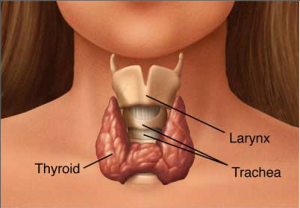About the thyroid gland
Many health problems, from fatigue and weight loss to sleep troubles and baldness, can be traced to dysfunctions of the thyroid gland. Learning about the thyroid gland, how it works, how it goes wrong, and how we can keep it healthy are all important to maintaining a balanced life.
Firstly, it’s important to know exactly what the thyroid is. Like the pituitary gland or the adrenal gland, the thyroid gland releases endocrine hormones essential to the body’s ability to function properly.
There are eight endocrine glands, from the pineal, which produces the circadian modulator melatonin, to the pancreas, which creates insulin.
Hyperthyroidism and Hypothyroidism
The thing about the thyroid gland that makes it so important, is its production of three major hormones: thyroxine (T4), triiodothyronine (T3) and calcitonin. Calcitonin keeps calcium levels in the blood from rising too high. Triiodothyronine and thyroxine manage the rates at which bodily systems grow and function.
Collectively, these last two hormones are responsible for controlling the speed at which the body produces proteins and uses energy, as well as regulating sensitivity to other hormones. When the factors that control these hormones are out of whack, serious symptoms develop. They can result from either hyperthyroidism, the product of too much thyroid hormone, or hypothyroidism, the product of too little.

Hypothyroidism can be caused by any number of things, including autoimmune disorders, stress, iodine deficiencies, congenital problems and surgery to remove the gland. Common symptoms include baldness, sensitivity to cold, slowed heart rate, fatigue, weight gain and memory problems.
Hyperthyroidism, meanwhile, is most often caused by Graves’ disease, in which malfunctioning antibodies compel the gland to create too much of its hormones.
Symptoms of hyperthyroidism include neck goitres, heavy sweating, weight loss, bulging eyes, irritability, muscle weakness, diarrhoea, sensitivity to heat, increased appetite, sleep problems and heart palpitations.
One thing that’s important to know about the thyroid gland is that the symptoms created by its malfunction often mirror those of clinical depression. Weight fluctuation, irritability, fatigue, sleep problems and memory deficits are all common to both thyroid conditions and major depressive disorder.
Thyroid cancer
Thyroid cancer can also cause problems with the gland’s ability to function, though there are usually few symptoms. A nodule may appear on the neck, followed by neck pain and voice changes later in the progression of the cancer.
There’s an easy way to avoid concerns about thyroid disease, and that’s to keep an eye on your thyroid. Swallow a gulp of water in front of the mirror several times, with your head tilted back. Watch the area above your collarbone and below your Adam’s apple. If you see bulges, protrusions or anything else unusual, call your doctor right away.
If you would like to learn more about the thyroid gland, or have questions about thyroid problems, see your local doctor who will arrange for you to see a thyroid surgeon.

